Very Low-Calorie Diet For Weight Loss – Benefits & Side Effects
While VLCD may help shed pounds, it may have adverse effects if followed for too long.
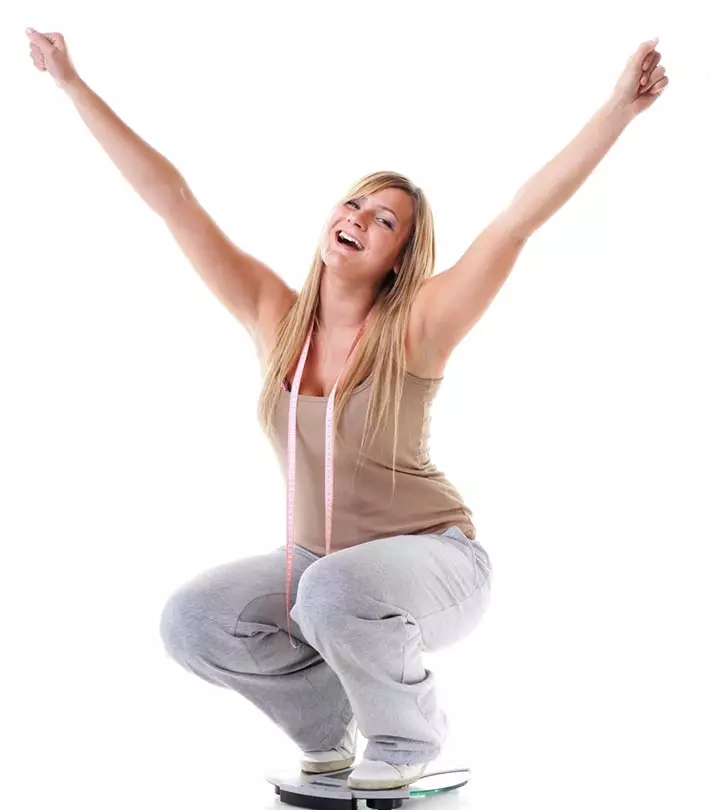
Image: Shutterstock
A planned and supervised low-calorie diet for weight loss can benefit people with BMI over 30. This 500-800 calorie diet replaces one or two of your meals with liquid shakes or smoothies. The National Library of Medicine reports that going on a VLCD helps lose 3-5 pounds per week (1). It can also reverse diabetes type 2, according to a breakthrough study by scientists at Newcastle University (2). Also, a VLCD helps lower cholesterol, blood pressure, and keeps the heart healthy. But VLCD is not for everyone. It is not safe for a perfectly healthy person. Read this post to know about VLCD, a VLCD diet plan, benefits, and side effects. Scroll down!
 Did You Know?
Did You Know?In This Article
How Does A VLCD Aid Weight Loss?
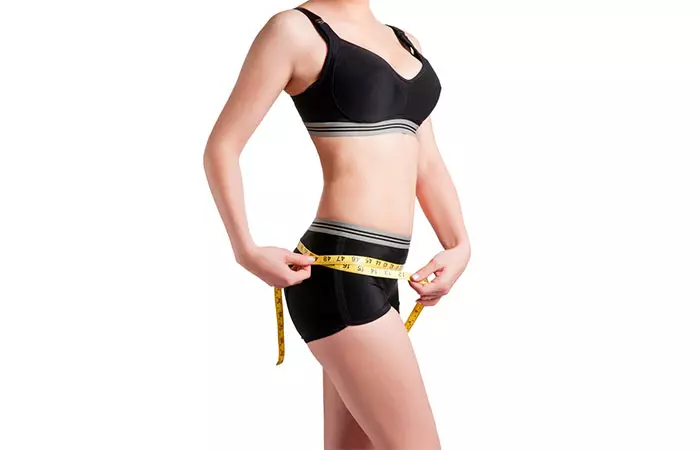
A VLCD lowers blood sugar, detoxifies the body, and improves insulini A hormone created by the pancreas that is responsible for regulating the amount of glucose in the blood. sensitivity, thus doubling the flab loss in a short period. After the scientists at the Newcastle University proved that VLCD can reverse diabetes type IIi A chronic condition in which the body does not produce enough insulin or respond to it, which results in unusual blood sugar levels. in human beings, scientists at Yale University used rat models to find out the way VLCD helps reverse diabetes type 2 (3). They found significant proof, and here are the details:
- VLCD Lowers Plasma Glucose: Being on a very low calorie diet for a few days can help lower your blood glucose/sugar levels. When your blood glucose levels are low, the cells will be less likely to store the unused glucose as fat.
- VLCD Improves Insulin Sensitivity: Improving insulin sensitivity can help the cells take up glucose from the bloodstream and use it as usable energy. This increases the satiety levels, lowers your food intake, and prevents you from gaining weight (flab).
- VLCD Reduces Gluconeogenesis: Gluconeogenesis is the biochemical pathway that leads to the synthesis of glucose (sugar) from non-carbohydrate sources, like protein. By reducing gluconeogenesis, your body will lower the amount of sugar in your blood and prevent the accumulation of excess sugar in the form of fat.
Key Takeaways
- VLCD replaces one meal with a smoothie or shake and benefits people with a BMI of over 30.
- This diet improves insulin sensitivity, increasing the cells’ ability to use glucose from the bloodstream as usable energy.
- Following this diet may help improve gut health and digestion, clean the colon, and relieve constipation.
- Children and pregnant or lactating women should avoid VLCD.
Other Ways A VLCD Aid Weight Loss
- Low In Calories: A very low calorie diet, as the name suggests, is very low in calories. When you consume fewer calories, the chances of storing the extra calories as fat are reduced. This leads to fat loss and eventually, slimming of the body.
- Consume Healthy Food: Say goodbye to junk food loaded with unhealthy refined carbs and trans fats, and learn to exercise food control. Healthy foods, cooked well (blanched, boiled, sauteed, baked, grilled or raw), are full of flavor and nutrition and will help you keep your calorie consumption low and lose weight without compromising your health.
- Detoxifies The Body: When you follow a VLCD, you will replace a solid meal with a liquid meal. And the best part of this change is that this liquid diet will help detoxify your body by adding a powerful dose of antioxidants. These scavenge the harmful oxygen radicals and lower the stress levels in your body. And this, in turn, leads to weight loss.
- Improves Gut Health: Replacing one or two meals per day can help improve your gut health. It will help clean your colon, improve digestion and absorption, and relieve constipation. When your gut starts to function normally, your metabolic rate will get a boost and help you convert the excess calories into energy.
So, it is clear that the VLCD works for weight loss. But is it for everybody who wants to lose weight? Well, here’s what you need to know.
Who Should Follow A Very Low Calorie Diet?
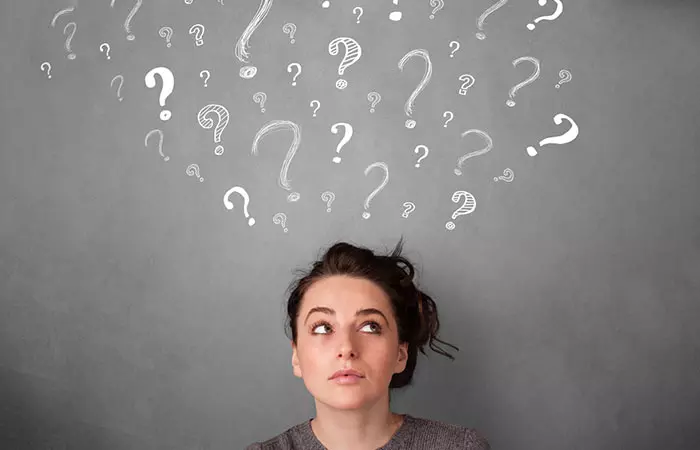
A very low calorie diet is NOT meant for everybody. It should be followed under the guidance of your doctor and a dietitian. And you can follow it if:
- Your BMI is over 30.
- Your obesity is threatening your life.
- You are not losing weight anymore, i.e., your weight loss has plateaued.
- You have already started following a sustainable and healthy lifestyle change by only healthy eating, meal planning and focusing on regular exercise and want to be on a “fast” once or twice a week.
 Trivia
TriviaIf you fall into this category, the next question is, for how long should you be on a VLCD? Find out in the next section.
For How Long Should You Be On A VLCD To Lose Weight?
Depending on the amount of flab you need to lose, your doctor will recommend you to be on a very low calorie diet anywhere from 1-3 months to 4-12 weeks for weight management. A dietitian will work with you to see if you need to be on a VLCD for all the 7 days of the week, or 3-4 days per week will get you the desired results.
NOTE: Be careful about overdoing a very low calorie diet. If your doctor suggests following a 3-day VLCD for 2 weeks, adhere to your her/his instructions.
If you are on a very low calorie diet, how much weight can you expect to lose by the end of your VLCD term? Find out next.
How Much Weight Can You Lose On A VLCD?
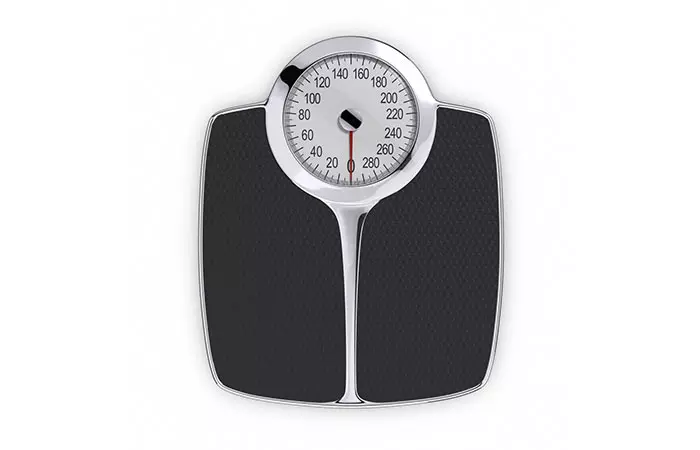
As mentioned at the beginning, you will lose 3-5 pounds per week. If you adhere to eating healthy, focus on fitness regularly, and follow a better lifestyle, by the end of 4 weeks, you will lose about 20 pounds. VLCDs can result in significant weight loss and improvements in metabolic health markers, such as blood pressure and blood sugar changes in body composition, including the loss of muscle mass and bone density. And by the end of 12 weeks, you will lose 60 pounds. But since the frequency of being on VLCD may change after a week or a month, you may lose an average of 44 pounds by the end of 12 weeks. Before beginning, you must also possess self-discipline, motivation, and accountability till you achieve your goals.
Sam, a practicing physician and a health care researcher, shared his experience of following a very low calorie diet for 15 days in his video. He said, “By the end of 15 days, I have lost 17.9 pounds (ⅰ).”
That’s a lot of flab you will lose in a short period. But what is it that you are allowed to eat? Here’s a sample very low-calorie diet chart for you to understand what you must avoid and what is considered healthy while you are on a VLCD.
Sample Very Low-Calorie Diet Chart
| Meal | What To Eat |
|---|---|
| Early Morning (7:00 – 7:30 a.m.) | 1 cup warm water with juice of half a lime and 1 teaspoon organic honey |
| Breakfast (8:00 – 8:15 a.m.) | Spinach and avocado smoothie Or Oats smoothie |
| Pre Lunch Snack (10:00 a.m.) | 1 cucumber |
| Lunch (12:30 p.m.) | Tuna/tofu salad + 1 cup buttermilk |
| Post Lunch Snack (3:30 p.m.) | 1 cup green tea + 2 saltine crackers |
| Dinner (7:00 – 7:30 p.m.) | 1 cup blended chicken/mushroom soup |
Total Calories:
632
You will be replacing any of the two meals (breakfast and lunch, lunch and dinner, or breakfast and dinner) with a liquid diet. The very low-calorie diet chart includes all healthy foods like fruits, veggies, healthy fats, nuts, seeds, grains, herbs, spices, and natural beverages. Avoid consuming high-sodium, high-sugar, and trans fats. Also, be careful with the hidden calories in packaged foods like ketchup, packaged drinks, sauces, etc. And also don’t forget to incorporate physical activity in your everyday routine. Here are some meal-planning tips to help:
- Take time each week to plan your meals beforehand. This minimizes the chance of settling for less nutritious options when you are short on time.
- Keep a grocery list handy to avoid impulse buying and stick to healthier options.
- Portion your meals into containers to avoid the temptation of overeating.
- Cook grains, roast veggies, and wash fruits in advance to save time during busy weekdays.
- Lastly, keep yourself hydrated and check in with your healthcare provider from time to time to ensure there are no nutritional deficiencies or other risks.
After following this diet for a few weeks, you will notice a gradual progress in your appearance and energy levels. And that’s because when VLCD is followed under the guidance of a professional, you will reap the following benefits.
Very Low Calorie Diet Benefits

- Lowers High Blood Pressure – VLCD may help aid weight loss. Since excess weight is linked to hypertension, following a guided very low calorie diet may also help lower high blood pressure (4) (5).
- Lowers LDL Cholesteroli Also known as “bad cholesterol”, waxy, fat-like substances that increase the risk of heart diseases and stroke. – Obesity is also linked with high LDL cholesterol (6). When you restrict your calorie intake and reduce weight with VLCD, it may also help lower the levels of bad or LDL cholesterol. This helps improve your heart health.
- Helps Reverse Diabetes Type II – A very low calorie diet can help you lose weight by lowering your blood glucose levels. As a result, this improves insulin sensitivity, leading to reversing diabetes type II (7).
- Makes Life Easier – VLCD is meant for morbidly obese adults and adolescents. After following a very low calorie and balanced diet for a while and losing a few pounds of fat, patients feel healthier and better. Life becomes better, and day-to-day tasks become easier.
- Improves Mental Health – Being overweight takes a toll on your mental health as well. VLCD helps patients lose a lot of weight quickly, increasing their confidence and self-worth.
- Increases Energy Levels – Once you start losing the flab, you will feel energetic and be active all day long. This, in turn, will help you lose more weight.
There is more to losing weight that just looking good. But, you should always be careful with these extreme diets. Let’s see the side effects of a very low calorie diet.
Very Low Calorie Diet Side Effects
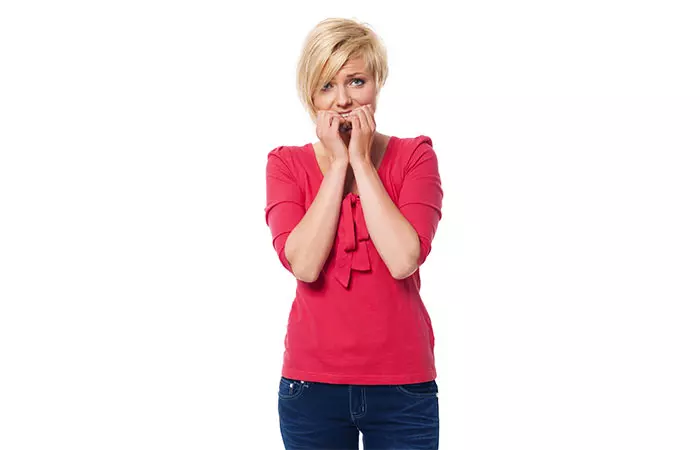
Here are some of the side effects linked to very low calorie diets:
- Nausea: Sudden calorie restriction may disrupt normal digestion, leading to queasiness or nausea (8).
- Fatigue: Since a very low-calorie diet requires extreme calorie reduction, it may deprive your body of essential nutrients and energy sources. This could lead to symptoms like fatigue and weakness.
- Gallstones: Rapid weight loss associated with very low-calorie diets may increase the risk of gallstone formation due to an imbalance in bile production (9).
- Constipation: If you do not consume enough fiber on the VLCD, it may lead to infrequent bowel movements and constipation (10).
- Diarrhea: Alternatively, if you consume too much fiber, it may cause diarrhea (11).
- Dry mouth: Diarrhea may also lead to dehydration, resulting in dry mouth (12).
- Hair loss: If your diet plan lacks proper nutrients like iron, zinc, and protein, you may experience hair fall (13).
- Malnutrition: Following a very low-calorie diet for a long time will hamper the body’s nutritional needs, especially if you are not having balanced meals. This may lead to deficiencies in essential vitamins, minerals, and macronutrients.
Now, here’s the fact. If you are not supposed to be on a VLCD, but you still are, you will be in the soup. Check out the next section to find out who should avoid being on a very low-calorie diet.
Who Should Avoid A Very Low-Calorie Diet?
- Pregnant and lactating women
- Children
- Women or men over the age of 50
- Mildly obese women/men who can lose weight by eating right and exercising
- Morbidly obese individuals who are not guided by a doctor/dietitian to go on a VLCD
- Perfectly healthy individuals who want to lose weight without exercising or eating healthy
Infographic: 5 Ways A Very Low-Calorie Diet May Improve Your Health
A very low-calorie diet involves consuming significantly fewer calories than the body’s usual energy requirements. It may promote weight loss and lower high blood pressure under proper clinical supervision. Check out the following infographic to know how this diet may improve your general health.
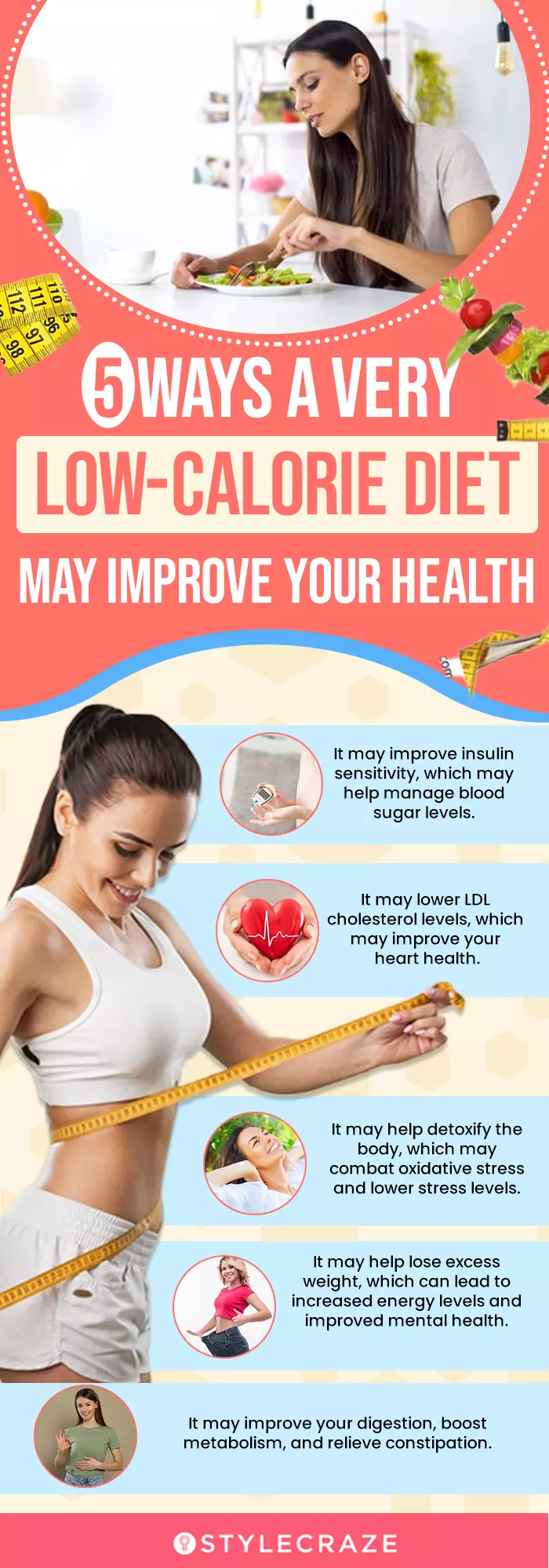
Illustration: StyleCraze Design Team
A very low-calorie diet, or VLCD, involves restricting calorie consumption between 500 to 800 calories and replacing one or more meals with liquids. It is not a long-term weight loss plan and can last between one and three months, depending on the amount of weight that needs to be lost and other factors such as age, and health conditions. A very low-calorie diet for weight loss should only be done under medical supervision and following strict guidelines to prevent negative health consequences. This diet has been studied to improve insulin sensitivity and cause substantial weight loss when practiced correctly.
Frequently Asked Questions
What does an 800 calorie day look like?
An 800 calorie diet meal plan for a day involves portion control. You have to divide your meals into small portions of nutrient-dense foods that are low in calories. For reference, you can have 1 boiled egg, 1 cup fat-free milk and half an apple for breakfast. For lunch, you can have a portion of tuna salad dressed with olive oil and lime. Dinner can be a cup of baked black beans accompanied by sauteed vegetables. You are allowed to have unsweetened and dairy-free green tea or coffee in between meals.
How do I create a calorie deficit?
You can create a calorie deficit diet by consuming fewer calories than you burn in a day. Perform activities that burn more calories than you have consumed or follow a combination of eating less and being more active. The idea is to have more calories out than in.
Is a low-calorie diet sustainable?
Yes, a low-calorie diet can be sustainable if planned properly and incorporates a well-balanced diet including all essential nutrients.
How can I stay motivated on a low-calorie diet?
Have realistic expectations, pick a plan that fits your lifestyle, and keep a journal to track your progress.
Are low-calorie diets safe?
Low-calorie diets are safe in general, but it is important to consult with a doctor before starting it.
Can I still eat my favorite foods on a low-calorie diet?
You can eat your favorite foods on a low-calorie diet but in moderation. Consult with your dietician regarding total calorie intake.
Illustration: Very Low-Calorie Diet For Weight Loss – Benefits & Side Effects
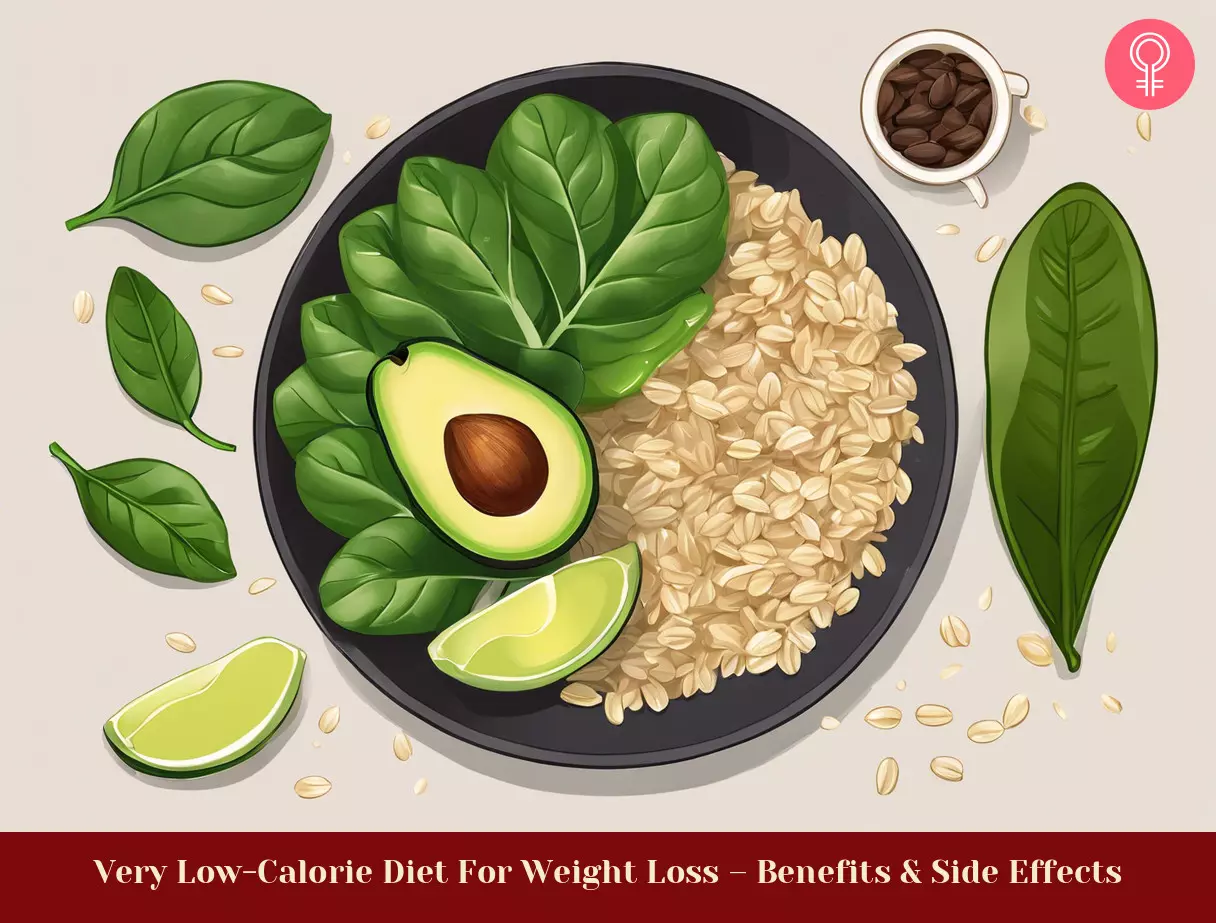
Image: Stable Diffusion/StyleCraze Design Team
Healthy eating doesn’t have to be boring! Check this video out and learn about delicious low-calorie foods that can help you lose weight and also let you have fun.
Personal Experience: Source
StyleCraze's articles are interwoven with authentic personal narratives that provide depth and resonance to our content. Below are the sources of the personal accounts referenced in this article.
i. I tried Very Low-Calorie Diet for 15 dayshttps://www.youtube.com/watch?v=mRJs7E50Y_A
References
Articles on StyleCraze are backed by verified information from peer-reviewed and academic research papers, reputed organizations, research institutions, and medical associations to ensure accuracy and relevance. Read our editorial policy to learn more.
- An eight-year experience with a very-low-calorie formula diet for control of major obesity
https://pubmed.ncbi.nlm.nih.gov/3360564/ - Very low-calorie diet and 6 months of weight stability in type 2 diabetes: Pathophysiological changes in responders and nonresponders
https://pubmed.ncbi.nlm.nih.gov/27002059/ - Mechanisms by which a very-low-calorie diet reverses hyperglycemia in a rat model of type 2 diabetes
https://pubmed.ncbi.nlm.nih.gov/29129786/ - Very low calorie diet (VLCD) followed by a randomized trial of corset treatment for obesity in primary care
https://pmc.ncbi.nlm.nih.gov/articles/PMC3442323/ - Obesity and hypertension
https://pmc.ncbi.nlm.nih.gov/articles/PMC5038894/ - Dyslipidemia in obesity: Mechanisms and potential targets
https://pmc.ncbi.nlm.nih.gov/articles/PMC3705344/ - Mechanisms by which a very low calorie diet reverses hyperglycemia in a rat model of type 2 diabetes
https://pmc.ncbi.nlm.nih.gov/articles/PMC5762419/ - Effects of calorie restriction on health span and insulin resistance: Classic Calorie Restriction Diet vs. Ketosis-Inducing Diet
https://pmc.ncbi.nlm.nih.gov/articles/PMC8071299/ - Risk of symptomatic gallstones and cholecystectomy after a very-low-calorie diet or low-calorie diet in a commercial weight loss program: 1-year matched cohort study
https://pmc.ncbi.nlm.nih.gov/articles/PMC3921672/ - Constipation
https://www.ncbi.nlm.nih.gov/books/NBK513291/ - Therapeutic benefits and dietary restrictions of fiber intake: a state of the art review
https://pmc.ncbi.nlm.nih.gov/articles/PMC9268622/ - Pediatric dehydration
https://www.ncbi.nlm.nih.gov/books/NBK436022/ - Diet and hair loss: effects of nutrient deficiency and supplement use
https://pmc.ncbi.nlm.nih.gov/articles/PMC5315033/
Read full bio of Merlin Annie Raj
Read full bio of Ravi Teja Tadimalla
Read full bio of Aparna Mallampalli








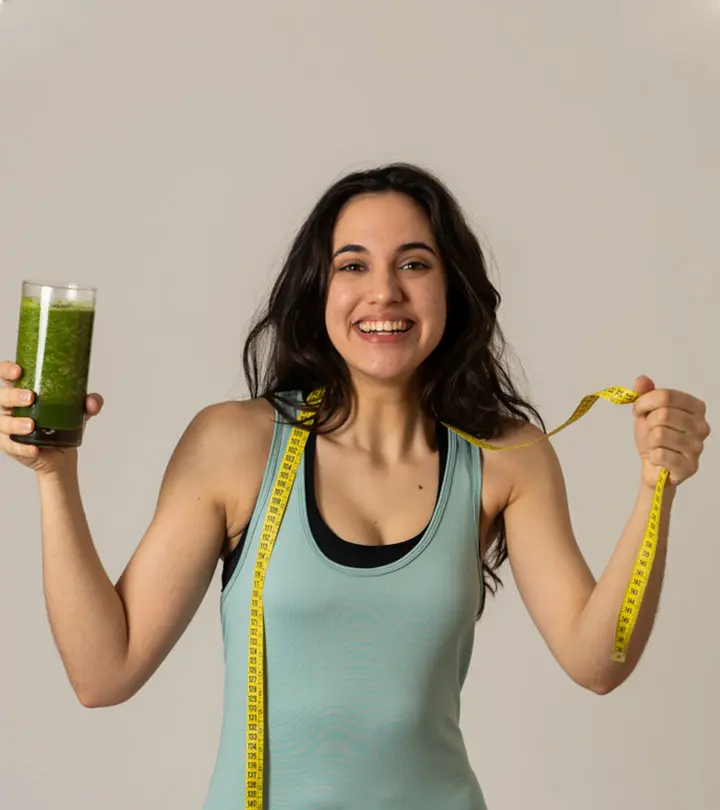
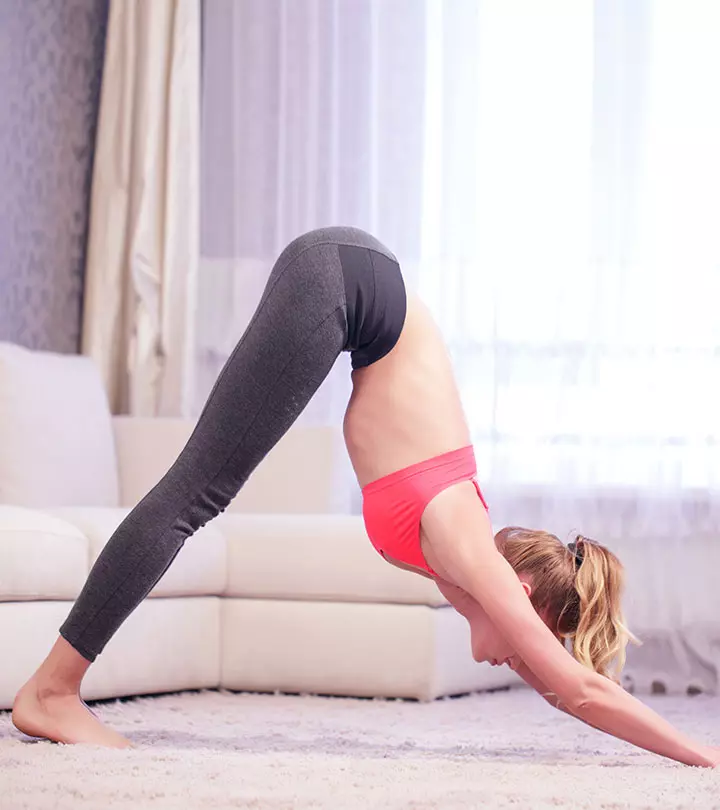
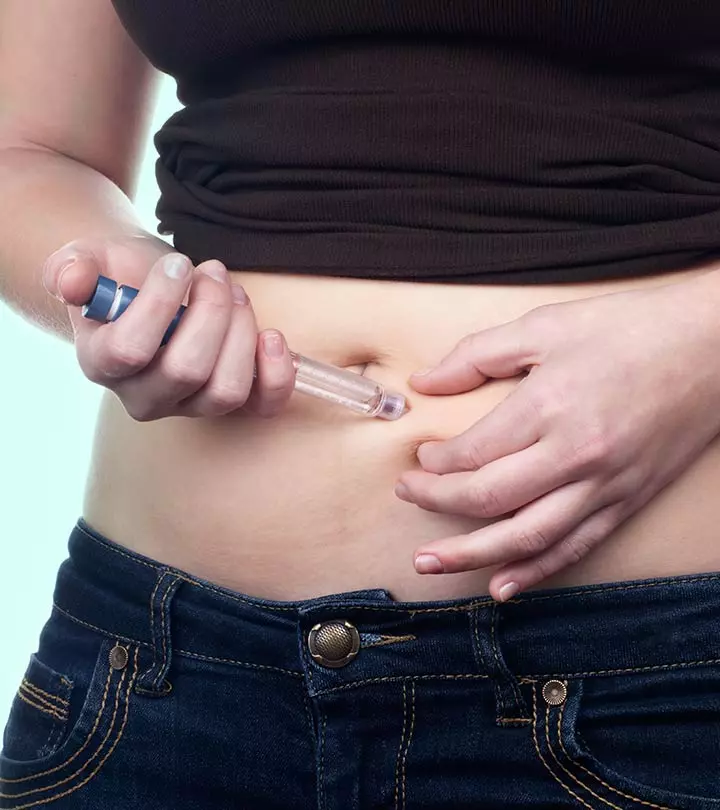
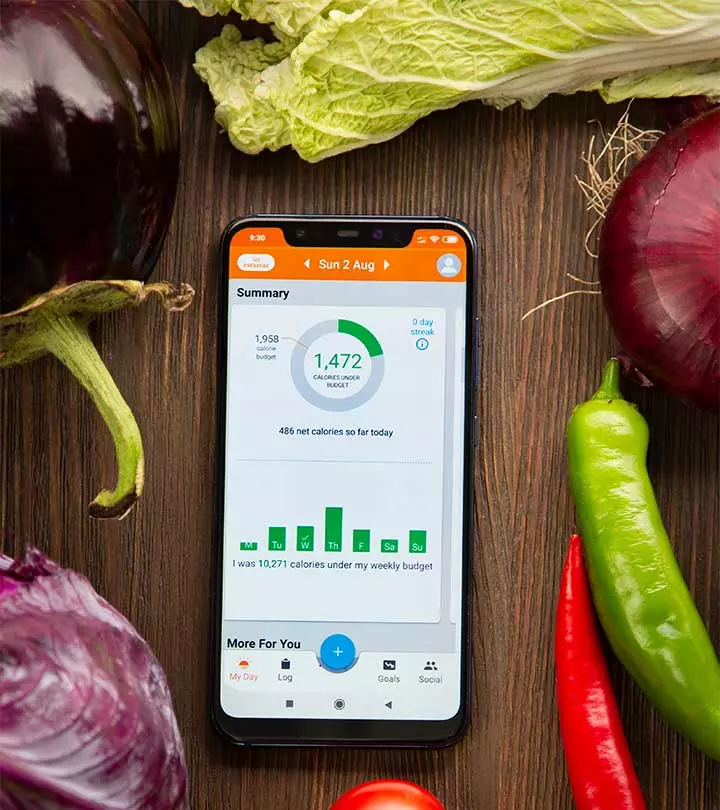
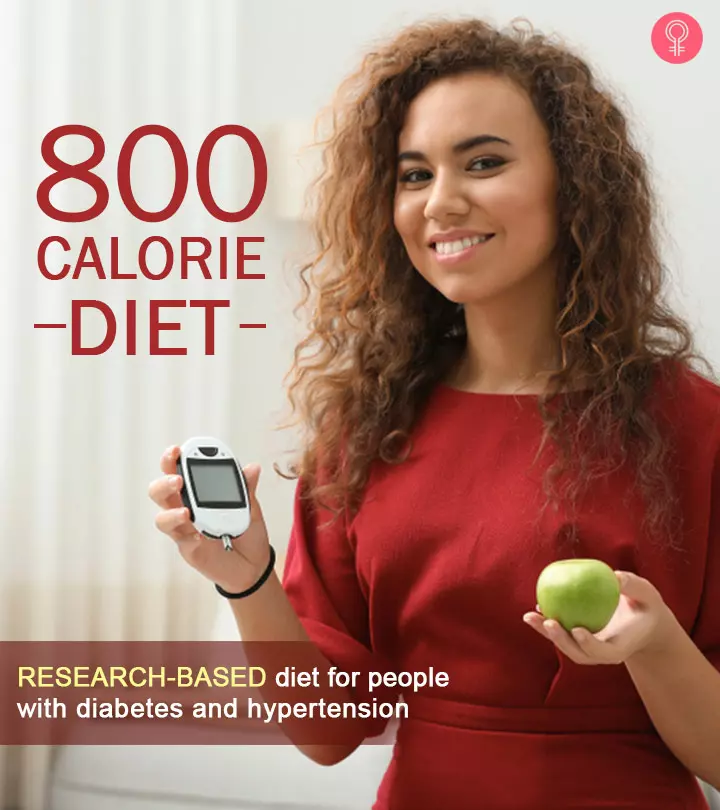


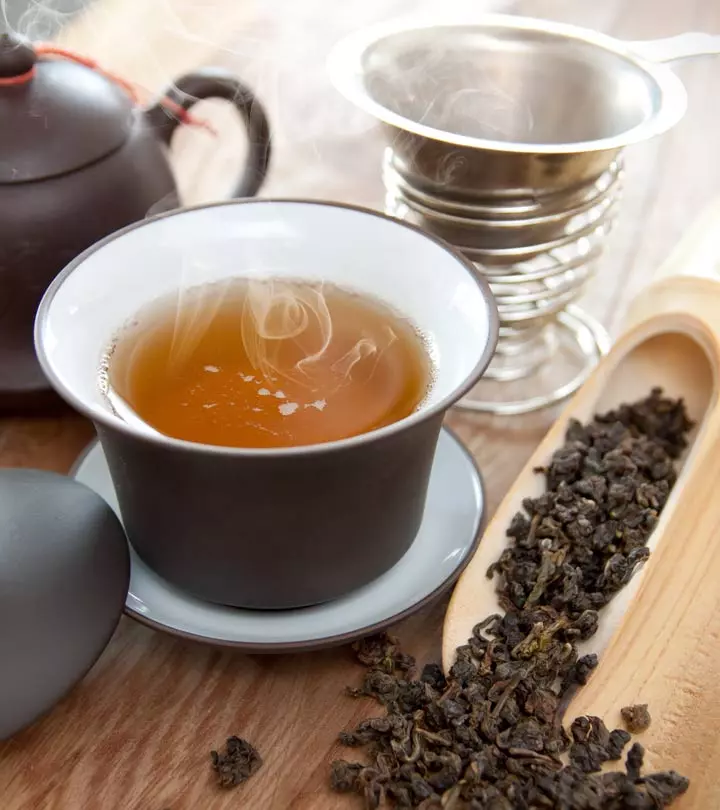
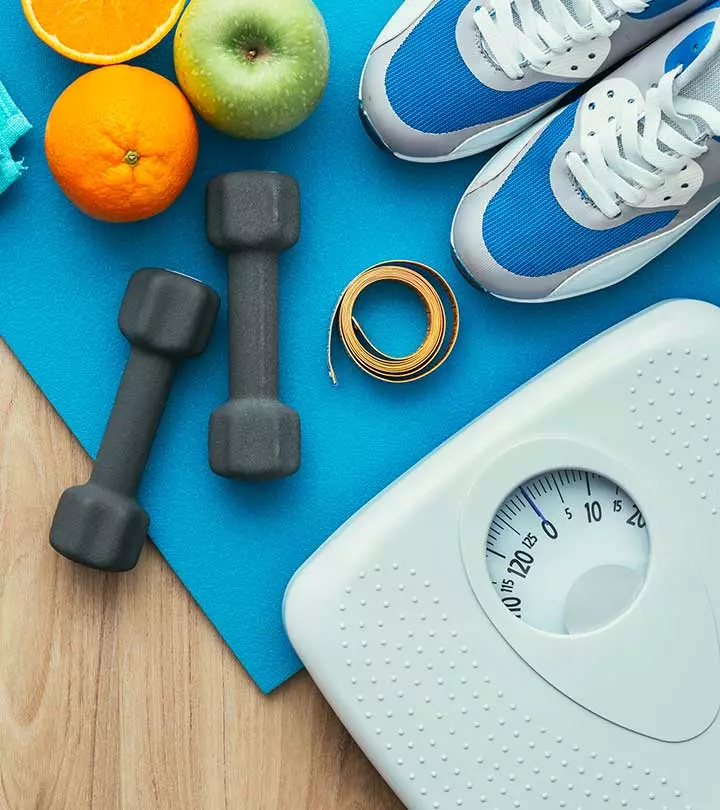
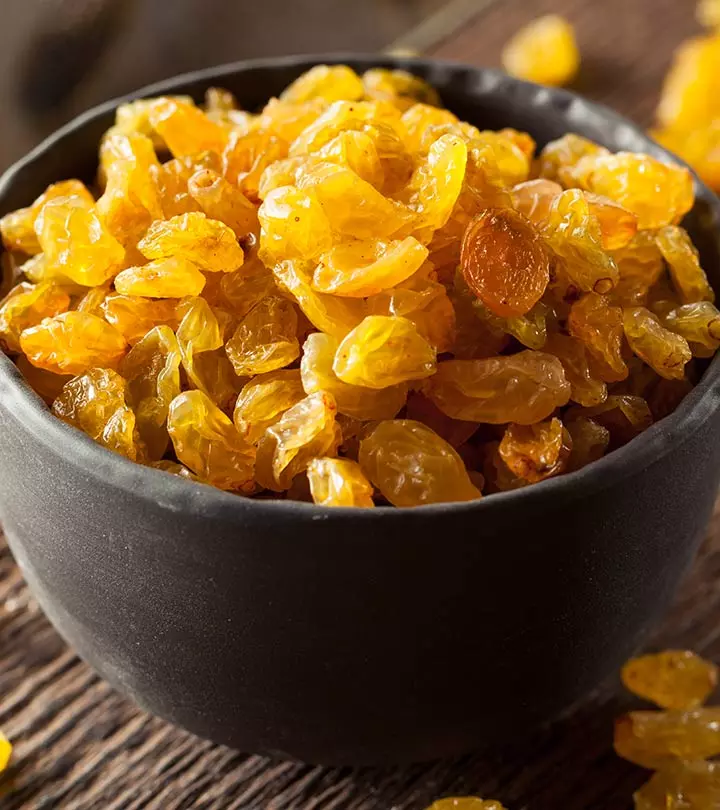
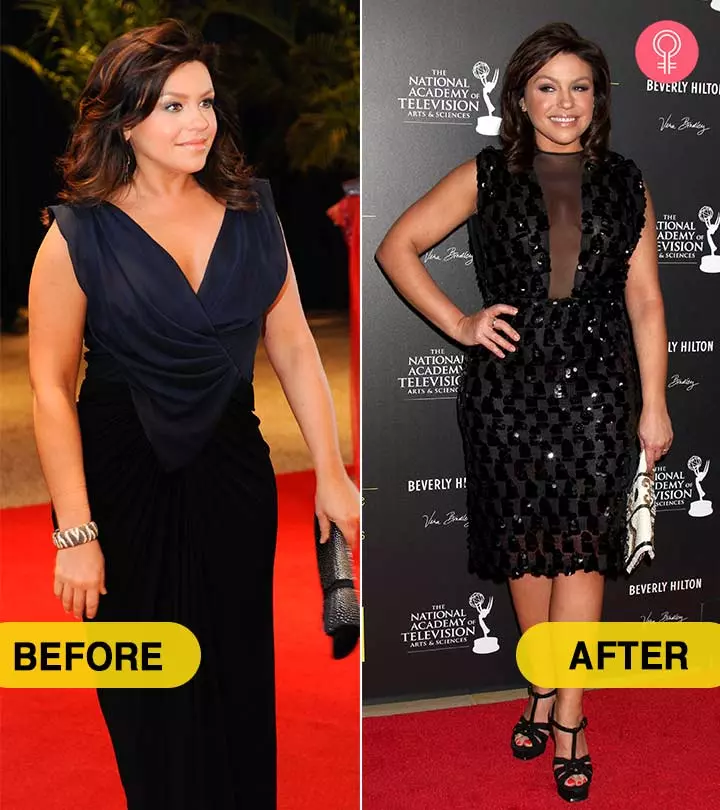
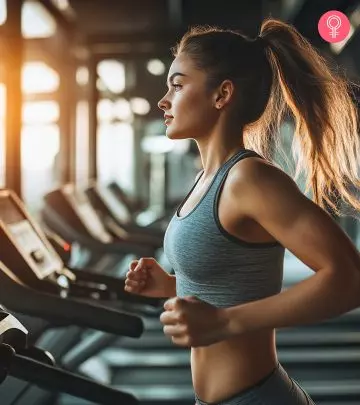


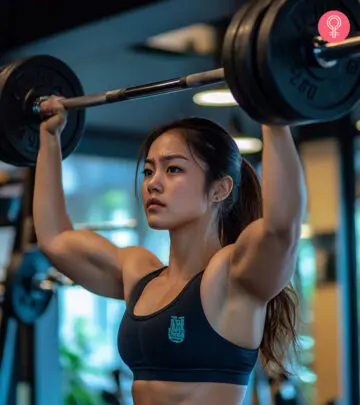
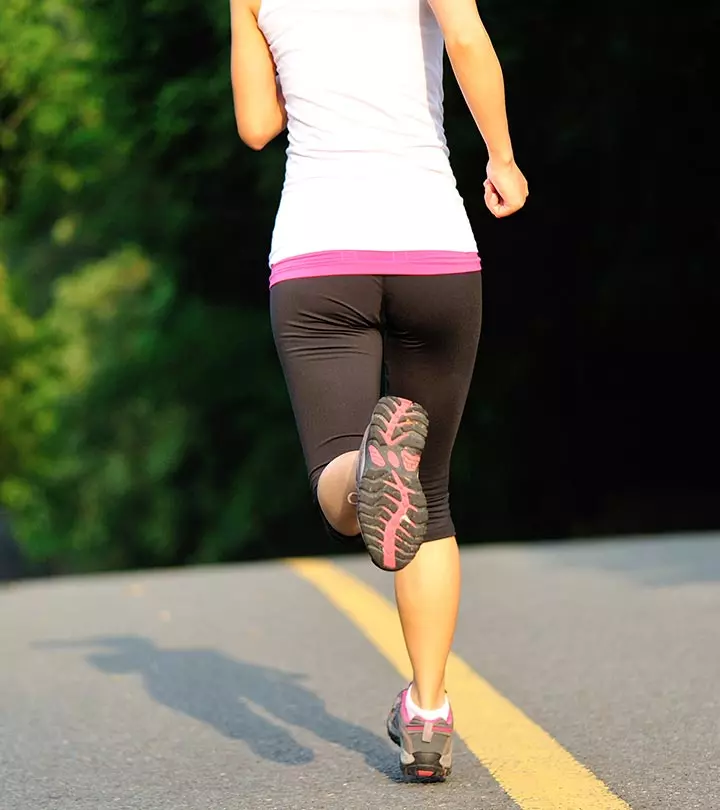
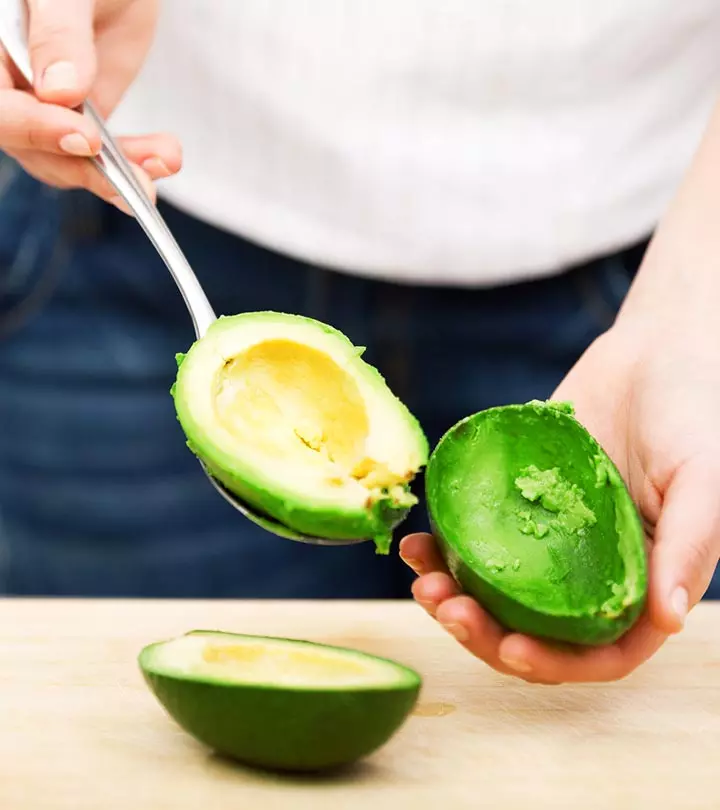
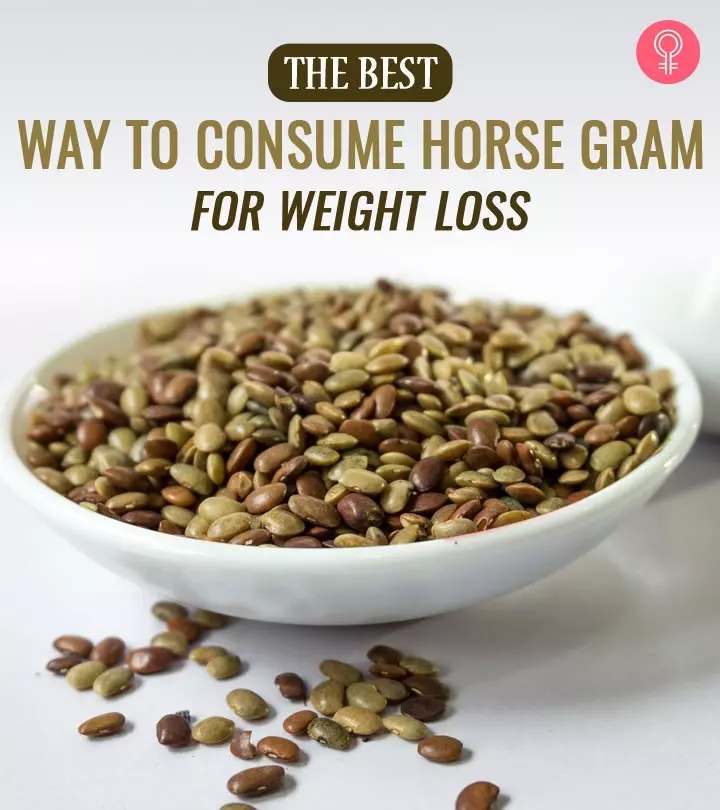

Community Experiences
Join the conversation and become a part of our empowering community! Share your stories, experiences, and insights to connect with other beauty, lifestyle, and health enthusiasts.